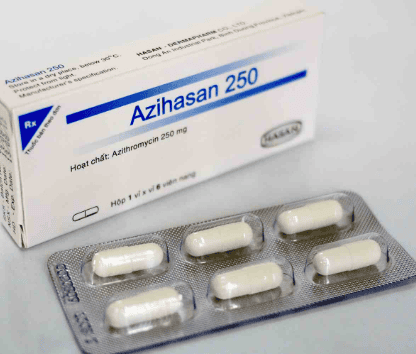This is an automatically translated article.
Azithromycin is an antibiotic commonly used in the treatment of respiratory infections (pneumonia, otitis media, ...). However, in a few studies on the side effects of Azithromycin, it was found that patients with certain risk factors may develop cardiac arrhythmias while using Azithromycin.
1. What is an arrhythmia?
The normal heart rhythm originates in the sinus node and beats in a rhythmic, cyclical and relatively regular manner. In a normal healthy person, the resting heart rate ranges from 60 to 100 beats/min. A normal heart rhythm will not cause any symptoms, sometimes the patient feels nervous, a feeling of heart palpitations in some situations such as fear, anxiety, fever, ... and this situation will quickly quickly return to normal.
Arrhythmia is an abnormal condition when the rhythm is too fast (> 100 beats / minute) or too slow (< 60 beats / minute) or irregular, sometimes fast and sometimes slow. Cardiac arrhythmias may have no symptoms or the patient feels palpitations, palpitations, heart palpitations,...
Arrhythmias can be caused by many causes such as a sudden heart attack, Heart surgery scars, cardiomyopathy, coronary artery disease, high blood pressure, hyperthyroidism, hypothyroidism, diabetes, some drugs, using stimulants such as alcohol, coffee, smoking,...
2. Azithromycin side effects
Azithromycin is a macrolide antibiotic, widely used in the treatment of bacterial infections. The mechanism of action of the drug Azithromycin is to target the protein synthesis of bacterial cells, leading to inhibiting the growth and proliferation of bacteria. Azithromycin drug easily penetrates into tissues in the lungs, bronchi, otolaryngology, ... and has an effect on bacteria such as staphylococcus, streptococcus, pneumococcus,...In addition to its therapeutic effect, the drug Azithromycin also causes some side effects, such as rash, allergies, difficulty breathing, difficulty swallowing, abdominal pain, nausea, ... and the most worrisome side effect is the effect on the cardiovascular system. Azithromycin can cause cardiac arrhythmias, although in a small proportion, but requires caution.
According to a study by scientists from Vanderbilt University (Tennessee, USA) on 348,000 prescriptions of Azithromycin in the period 1992 - 2006. The interesting issue of the study is the unusual expression and effects. in patients taking medication. To exclude confounders, the researchers used epidemiological tools. The results of the study showed that the rate of death from cardiovascular disease was 2.5 times higher in those who took the antibiotic Azithromycin compared with those who did not.
3. Azithromycin and arrhythmias
In 2013, the US Food and Drug Administration (FDA) issued a safety warning that Azithromycin could cause fatal heart rhythm disturbances in some patients, based on this warning. on a study in 2012.
In the opinion of Dr. Gianluca Trifirò (Erasmus University Medical Center, Rotterdam, the Netherlands and University of Messina, Italy), the results of the studies show an association between Azithromycin and tangles. arrhythmias are more likely to be caused by the patient's impaired health than by the medication. The risk of arrhythmia with Azithromycin is negligible compared with other antibiotics, even in high-risk patients (elderly, with a history of cardiovascular disease,...).
To clarify the contradictions about the association between Azithromycin arrhythmia, scientists conducted the ARMITO study analyzing data on more than 28 million patients in European countries from 1997 to 2010 (Dan). Circuit, Dutch, German, Italian, English).
According to the study, there were 12,874 patients who had developed ventricular arrhythmias, each patient was paired with 100 control patients (same age, sex, start date of antibiotics). When compared with controls, patients with ventricular arrhythmias were most likely to experience ventricular fibrillation, cardiomyopathy, coronary artery disease, electrolyte disturbances, hypertension, peripheral arterial disease, and antiarrhythmic drugs. Pre-existing rhythm, diabetes, obesity, chronic respiratory disease, dyslipidemia, taking drugs that cause hypokalemia, drugs that prolong the QT interval.
Among the patients with ventricular arrhythmias, 1221 were on antibiotics at the time: Azithromycin (30 patients), amoxicillin (165 patients), or another antibiotic (1026 patients). Accordingly, the use of Azithromycin caused ventricular arrhythmias compared with those not taking antibiotics, but this risk was not significant when compared with Amoxicillin users (after adjusting for confounding factors).
4. Proper understanding of how to take Azithromycin
Before being prescribed Azithromycin, tell your doctor if you have the following conditions:
Allergy to any ingredient of Azithromycin or any other allergies. History of liver disease, kidney disease, muscle disease such as myasthenia gravis. Also, tell your doctor about all medications you are taking, including prescription and over-the-counter medicines, herbal products, vitamins, minerals,...
Azithromycin may prolong the QT interval causes rapid, irregular heartbeat and other symptoms such as dizziness, fainting, etc. The risk of QT prolongation is increased in patients taking other drugs that prolong the QT interval or have certain medical conditions.
The following people need to be careful when using Azithromycin:
The elderly. Infant. Pregnant women. Breastfeeding mothers
Please dial HOTLINE for more information or register for an appointment HERE. Download MyVinmec app to make appointments faster and to manage your bookings easily.
Reference source: www.vinmec.com.













